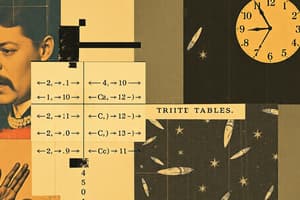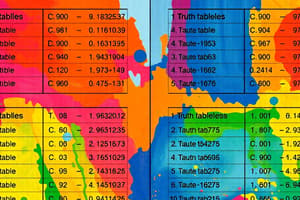Podcast
Questions and Answers
Согласно таблице истинности, когда утверждение, состоящее из нескольких пропозиций, является истинным при использовании операции конъюнкции?
Согласно таблице истинности, когда утверждение, состоящее из нескольких пропозиций, является истинным при использовании операции конъюнкции?
- Когда хотя бы одна пропозиция является истинной
- Когда хотя бы одна пропозиция является ложной
- Когда все пропозиции являются истинными (correct)
- Когда все пропозиции являются ложными
Какая из этих операций в пропозициональной логике представляет условный 'Если p, то q'?
Какая из этих операций в пропозициональной логике представляет условный 'Если p, то q'?
- Отрицание
- Импликация (correct)
- Дизъюнкция
- Конъюнкция
Какая из этих операций в пропозициональной логике представляет логическое ИЛИ?
Какая из этих операций в пропозициональной логике представляет логическое ИЛИ?
- Конъюнкция
- Отрицание
- Импликация
- Дизъюнкция (correct)
Что представляет собой аксиоматический подход к пропозициональной логике?
Что представляет собой аксиоматический подход к пропозициональной логике?
Согласно таблице истинности, когда утверждение, состоящее из нескольких пропозиций, является ложным при использовании операции дизъюнкции?
Согласно таблице истинности, когда утверждение, состоящее из нескольких пропозиций, является ложным при использовании операции дизъюнкции?
Flashcards
Propositional Logic
Propositional Logic
A formal system that uses logical connectives like 'and', 'or', 'not', and 'implies' to represent and reason about relationships between propositions.
Propositions
Propositions
Statements that can be either true or false, such as 'The sky is blue' or '2+2=5'.
Tautology
Tautology
A special kind of proposition where all possible truth assignments result in a true value. These are always logically true.
Contradiction
Contradiction
Signup and view all the flashcards
Truth Table
Truth Table
Signup and view all the flashcards
Study Notes
Introduction
Propositional logic is a branch of mathematics that deals with propositions, their connectives, and logical consequences. It is concerned with determining whether given propositions are true or false based on certain assumptions, conditions, or evidence. Propositional logic focuses on simple statements that consist of predicates and variables connected through connectors such as 'and', 'or', 'not', and 'implies'. Despite being a relatively straightforward area of logic, it is crucial for understanding more complex aspects of logic, particularly in areas such as computer science and artificial intelligence.
Fundamentals of Propositional Logic
The primary goal of propositional logic is to determine the logical properties of sets of propositions, often referred to as sentences. A set of sentences is said to be satisfied by a valuation if each sentence in the set is assigned True under that valuation. If a set of sentences is satisfied by every valuation, it is called a tautology. Conversely, a set of sentences is a contradiction if it is not satisfied by any valuation.
Truth Tables
Truth tables are an effective tool for determining the truth or falsity of simple propositions. They represent the possible truth values of a sentence using the Boolean values False (denoted as 0) and True (denoted as 1). These tables provide a systematic way to analyze the logical relationships among propositions, allowing us to derive the logical consequences of a set of sentences.
Connectives and Their Properties
Connectives play a vital role in propositional logic. The most common ones include:
-
Conjunction ('and'): Symbolized by '∧', conjunctions combine multiple propositions into a single compound proposition. The truth table for conjunction shows that a conjunction is true only if all its components are true.
-
Disjunction ('or'): Symbolized by '∨', disjunctions represent the logical OR operation. A disjunction is true unless all input propositions are false.
-
Implication: Implication represents the conditional 'If p, then q' and is symbolized by '→'. Implications are true unless the antecedent is true and the consequent is false.
-
Negation ('not'): Negation is represented by '¬'. The truth table shows that the negation of a proposition is true exactly when the original proposition is false.
Advanced Topics in Propositional Logic
Apart from the basics discussed above, propositional logic encompasses several advanced topics. Some of these include:
-
Axiomatic Propositional Logic: This approach involves boiling down propositional logic to its essential elements, studying what those elements are capable of doing. It is a more rigorous understanding of the axiomatic approach than Euclid's work.
-
Mathematical Induction: A mathematical technique used in logic and mathematics to prove properties or statements true for an infinite sequence of numbers or objects by showing that they hold for 0 (or 1), then using induction to show that if they hold for n, they also hold for n+1.
-
Deduction Theorem for Propositional Logic: A theorem connecting formal proof systems with natural deduction systems. The deduction theorem allows us to convert certain types of logical arguments from one system to another.
-
Set Theory: Set theory provides a framework for organizing and studying collections of objects called sets. In the context of propositional logic, set theory can be used to analyze relationships among propositions and their logical consequences.
-
Modal Logic: Modal logics extend classical propositional logic by introducing operators such as 'necessarily' and 'possibly'. These operators allow us to reason about necessity and possibility, making modal logics particularly useful in various areas like computer science and artificial intelligence.
-
Peano Arithmetic: Peano arithmetic is an axiomatic theory of arithmetic based on the rules of basic arithmetic operations. Though not directly part of propositional logic, it is related to advanced topics in logic and has applications in modeling various aspects of reality.
In summary, propositional logic is a fundamental area of study within logic, dealing with the relationship between simple statements and connectives. Its principles form the basis for understanding complex arguments and reasoning processes, making it a crucial component of numerous fields, including computer science and philosophy.
Studying That Suits You
Use AI to generate personalized quizzes and flashcards to suit your learning preferences.




